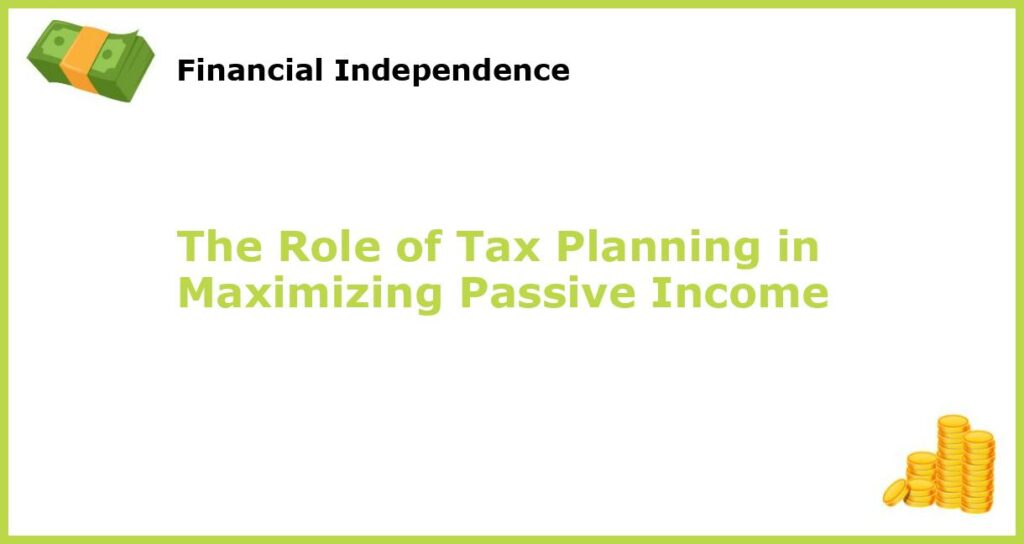Investing in passive income is one of the smartest investment strategies anyone can follow. However, it goes beyond just blindly investing in it. Maximizing returns on this type of investment involves considering other aspects that come with it. One of these includes tax planning. To maximize your returns on passive income, tax planning could be one of the most important aspects to consider. By taking advantage of all available tax deductions and credits, you can minimize the amount of taxpayer’s money you give to the government, leaving more funds available for investment and placing you in a better position to achieve financial freedom.
Understanding the Basics of Tax Planning

Tax planning refers to the art of arranging your financial affairs in such a way that you can minimize the amount of tax you pay to the authorities. Essentially, tax planning works by taking full advantage of all available tax incentives, exemptions, and deductions to minimize a taxpayer’s tax burden. By doing so, individuals can keep more of their hard-earned cash and channel it towards passive investments which in the long run shall increase their net worth.
The Benefits of Maximizing Passive Income

Passive income is an excellent source of residual income that can provide ongoing support over an extended period. Benefits of passive income include long-term financial stability and the ability to ensure cash flow throughout an individual’s lifetime. No one wants to worry about how they will make ends meet when they stop working, and this is where passive income comes in. Maximizing your returns on profitable passive income sources reduces the burden of having to work throughout your life.
Maximizing Your Returns with Tax-Efficient Investment Strategies

Tax-efficient investment strategies are mainly focused on minimizing the amount of tax paid and maximizing the income earned. By investing in various funds, from mutual funds to ETFs, you can benefit from the appreciation of the investment while minimizing the tax burden. Some tax-friendly investments include municipal bonds that have tax advantages and tax-efficient funds that are designed to minimize taxes. Having the right tax-efficient investment strategy can lead to big gains over the long run for an investor.
The Impact of Tax-Deferred Investment Accounts

Tax-deferred investment accounts are investment accounts that enable you to defer paying taxes on investment gains until you withdraw from the account, which could be many years from now. An excellent example of a tax-deferred investment account is a 401k or IRA account that is widely popular globally. By investing through a tax-deferred account, you can save tremendously on taxes and compound your earnings over a longer time frame.
Harvesting Investment Losses to Minimize Tax Liability

While no one wants to bear losses, they are a natural occurrence in the investment world. However, one strategy you can adopt is to use these losses as an offset for profits to minimize tax liability. This technique is known as tax-loss harvesting, where investors can use these losses to offset gains on other investments. By doing this, they reduce their overall tax liability for the year and could even receive a tax refund.
The Importance of Staying Up-to-Date with Tax Law Changes

Tax laws and regulations change all the time. Keeping informed of these changes can help investors stay on top of their tax situation and take advantage of all the available tax savings opportunities. It is imperative to have a tax professional or a financial advisor working with you in ensuring that you are well equipped and well informed of any tax changes made.
The Role of Timing in Maximizing Tax Savings

Timing is an essential factor for any investor. This is because the timing of investments can affect the amount, and frequency, of taxes paid. For example, if you’re planning to sell an asset, it might be better to wait until the following tax year to take advantage of lower tax rates. Or, if you expect to have a bad investment year, accelerating the sale could offset gains with losses in the current tax year. The emphasis is to work with a tax professional closely to ensure that you make the best decisions.
Planning Your Estate to Maximize Tax Benefits

Estate planning is an important consideration when it comes to tax planning. Planning for this eventuality helps you minimize and even eliminate estate taxes, reducing the financial burden on your heirs in the process. By creating comprehensive estate plans, investors can ensure their estate is distributed according to their wishes.
Working with a Tax Professional to Maximize Your ROI

Working with a tax professional can bring a lot of benefits to an investor. These experts offer vital advice on the latest strategies and tax law changes, and help investors identify opportunities to take advantage of available credits, deductions, and tax benefits. By developing a tailored tax plan for each individual, investors are well equipped to navigate the complicated tax world.







